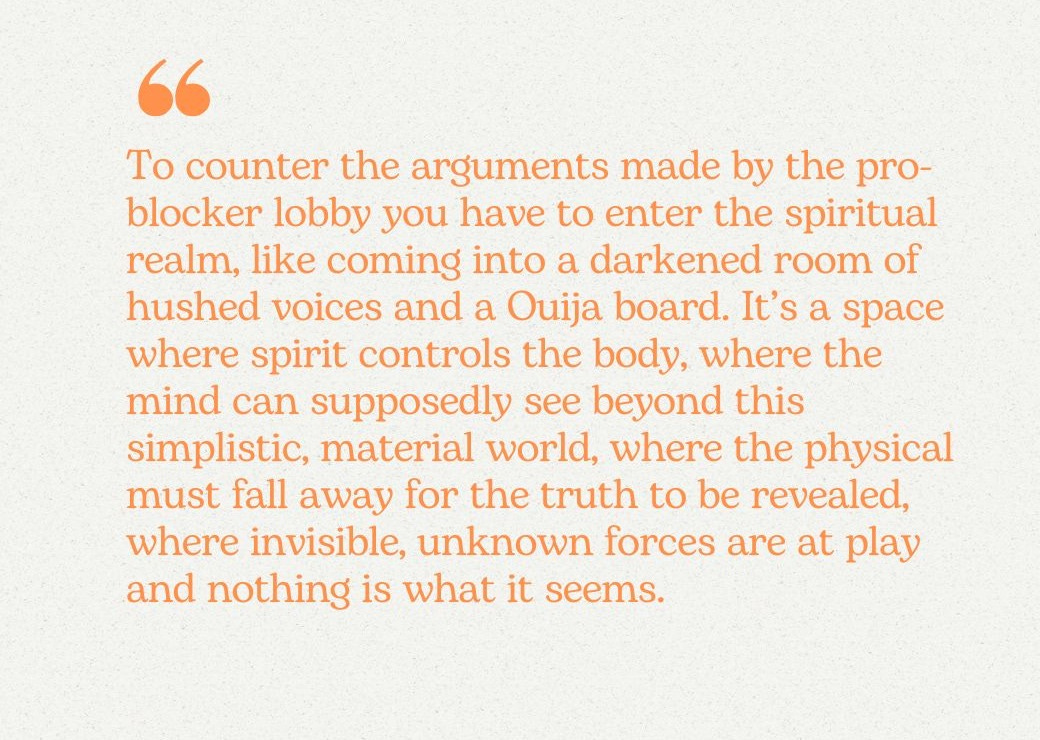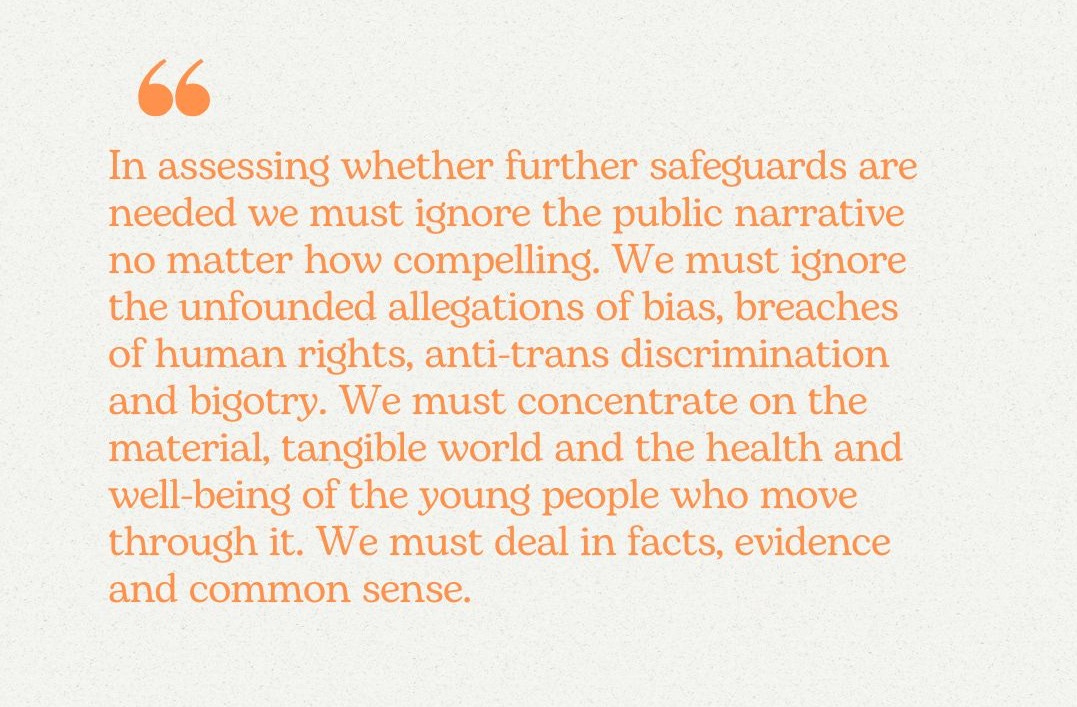Puberty blockers are ghoulish
In which I struggle to write a submission to the Ministry of Health
Note: my references to puberty blockers relate to their use in treating gender dysphoria and gender-related issues not for precocious puberty or other conditions.
The troubles
I’ve been having real trouble with my submission on puberty blockers. I feel despair as the pro-blocker lobby—well—lobbies hard. It’s crying genocide and suicide and anti-trans discrimination and bias and breach of human rights. Sometimes all in the same paragraph.
Lobbyists are pulling out all the big stops. I can see why. The plain unsullied facts, evidence and research show that prescribing puberty blockers for gender dysphoria is problematic at every level. For those who have wholeheartedly given their hearts and souls and children up to the gods of gender identity and gender-affirming care, that is going to be a huge existential threat. The emerging evidence will be seen as an attack on them and their children. As such they have to buckle down and say more and more alarming things. They need to distract from the common sense, the scientific rigour, the compassion and the obvious decency of puberty blocker critics. It would break them to accept that, although largely well-intentioned, on closer inspection puberty blockers are a bad idea.
For readers who aren’t aware, in November, after months of delays, the New Zealand Ministry of Health released an Evidence Brief on the impact of puberty blockers in gender-dysphoric adolescents. It basically showed the same thing as the Cass Report: there is no good clinical evidence to support the prescription of puberty blockers for gender dysphoria. The Ministry also issued a Position Statement saying that puberty blockers should only be prescribed by a cross-disciplinary team, only by those who are familiar with gender-affirming care and that patients and families must be made aware of the risks and the evidence. The Ministry said these were the immediate safeguards that were being put in place. Pro-blocker lobbyists say that’s what we do anyway, the status quo remains and the current New Zealand approach is vindicated.
At the same time as issuing the Evidence Brief and Position Statement, the Ministry opened a consultation in which the public was invited to send in their ideas about whether there should be additional safeguards and what they should be. Everyone, on every side, is saying this is weird.
I think my difficulty in writing a submission is partly because the underlying premise of puberty blockers is so irrational. I can’t argue in the usual matter-of-fact ways about matter-of-fact things because there’s no shared acceptance of facts.
We’re in a weird situation where theory, speculation and denial of material reality is seen as having a legitimate place in the health sector. Policy-makers nod wisely and pull serious faces as they hear the testimonies of those who discount evidence, the Hippocratic Oath and biological fact as irrelevant. Government departments stack expert panels with people who believe in an invisible, unverifiable gender identity that is more significant than sex, who believe that by some mysterious force babies can be born in the wrong body, that people can change sex through uttering words, that gender is both fluid and may change multiple times in a lifetime but also, once declared, requires irreversible medication; people who believe that only children know who they truly are; people who believe that “leaving trans kids alone” means giving them drugs of which the full effects are unknown.
To counter the arguments made by the pro-blocker lobby you have to enter the spiritual realm, like coming into a darkened room of hushed voices and a Ouija board. It’s a space where spirit controls the body, where the mind can supposedly see beyond this simplistic, material world, where the physical must fall away for the truth to be revealed, where invisible, unknown forces are at play and nothing is what it seems. It’s not my world, I want to draw the curtains and open the windows, let the breeze come in, and reveal the fraudster in the corner pulling the wires.
How has our health policy come to this? Where is the clinical skepticism? Where are the standards? Where is the risk versus benefit analysis? Where is the observation of a threshold of evidence to be met before we make the radical choice to stop a kid growing up? How do we get out of this situation?
So maybe my submission should say something like this…
Fifteen years of fierce advocacy for gender-affirming healthcare has been highly successful in New Zealand.
Gender-affirming healthcare is based on the assumption that every individual has a gender identity that is more important than their biological sex. Someone's gender identity is an invisible, unverifiable entity known only to them and indicates their true authentic self. Sometimes an unknown amorphous force might stuff up and a person's gender identity and physical body won't match. By those who believe in this phenomenon, this may variously be described as “being born in the wrong body”, as having a “female brain in a male body” (or vice versa) or having a “health condition” that requires medication to fix it. For children and young people, this unexplained quirk of nature means facing the horror of an “unwanted” or “wrong” puberty. In this case, gender-affirming care in the form of puberty blockers is considered essential healthcare.
These quasi-spiritual ideas, emanating from lobbyists and academics in the United States, have permeated New Zealand. They are taught in schools as fact, have bled into curriculum guidance, have been adopted in national data standards, were reflected in the latest confused census questions and are the basis of guidance provided to the public sector. The health sector defers to gender healthcare guidelines written by those whose starting point is an unquestioning commitment to these highly contestable ideas.
Under the guise of inclusion, the government has funded groups to teach the ideas in schools and workplaces and to run workshops for the health sector. Attempts have been made to render critiques of gender identity theory and gender affirmation as illegal hate speech. Mainstream media has published endless unironic stories of children whose lack of conformity to sex-based stereotypes is seen to make them suitable candidates for medicalisation. The likely influence of sexism, homophobia and children’s natural inclination for fantasy play is seldom discussed.
This is the cultural context in which puberty blocker prescription has thrived in Aotearoa. In assessing whether further safeguards are needed we must ignore the public narrative no matter how compelling. We must ignore the unfounded allegations of bias, breaches of human rights, anti-trans discrimination and bigotry. We must concentrate on the material, tangible world and the health and well-being of the young people who move through it. We must deal in facts, evidence and common sense.
Under stark light puberty blockers are ghoulish.
Puberty blockers disrupt the highly complex, sophisticated, internal biological process that transforms a human child into a human adult. Puberty blockers deprive young humans of the capacity to grow and develop, not as a side effect or unwanted consequence of the drug, but by intent. A young person ages while their body stops producing some of the hormones that help them grow up emotionally, mentally, physically and sexually.
This is not a mild intervention and this is not health care. It introduces a barrier to health and wellbeing. Puberty blockers are a direct attack on children and young people’s humanity. They are inhumane and they breach human rights.
Article 6 of the United Nations Convention on the Rights of the Child, to which New Zealand is a signatory, says “States Parties shall ensure to the maximum extent possible the survival and development of the child.”
Article 19 of the Convention says “States Parties shall… protect the child from all forms of physical or mental violence, injury or abuse, neglect or negligent treatment, maltreatment or exploitation, including sexual abuse.”
The only clinical justification for puberty blockers would be that the known health benefits of puberty blockers outweigh the known and unknown harms of disrupting natural puberty. The Cass Report and the Ministry of Health Evidence Brief could find no good evidence about the safety or effectiveness of puberty blockers in resolving gender distress, in reducing suicidality or in improving mental health. There is no justification for puberty blocker prescription.
The pro-puberty blocker lobby has worked hard to undermine the Cass Review. The release of the Ministry’s Evidence Review has re-invigorated the New Zealand lobby. InsideOUT Kōaro, whose recent annual reports indicate about a million dollars of government funding each year, is spearheading a campaign to get its followers (many of them young people who would have first come across the group in a classroom setting), to send in submissions that reject the idea of further safeguards. It is a campaign that fosters panic among young people and parents. It suggests that attempts to introduce normal, rational safeguards based on the best available information are motivated by a desire to harm young trans-identified people.
Hilary Cass has said “If you deliberately try to undermine a report that has looked at the evidence of children’s healthcare, then that’s unforgivable. You are putting children at risk by doing that.”
New Zealand has an opportunity to make a change. Those who have an ideological commitment to a single unproven medical pathway for gender dysphoria should not be shaping healthcare policy or setting guidelines. Our young people deserve better. Please ban the prescription of puberty blockers in New Zealand.
Related
Ministry of Health call for submissions - closes this coming MONDAY 20th of January 2025.
Speak Up for Women press release on the Evidence Brief and consultation
Speak Up For Women’s submission
Puberty blockers—a human wrong: Resist Gender Education’s submission
Dodging a bullet: an anonymous submission on the SUFW website
Where do we go now with puberty blockers?, Charlotte Paul, NZ Herald, 9 January 2025.
Use of puberty-blocking hormones for gender dysphoria in New Zealand: descriptive analysis and international comparisons, Charlotte Paul, Simon Tegg and Sarah Donovan, New Zealand Medical Journal, 2024 Sep 27: 137(1603).
A terrible trap, Charlotte Paul, North & South, December 2023.







Your introductory paragraphs are gold… but so is the text you finally settled on. It’s a true mystery why the public is being consulted because the MOH already holds all the evidence it needs to ban PBs - all it lacks is the moral courage to do the right thing.
Excellent submission and respect to you for struggling to find the right wording. The submission by 'anonymous' is very recognizable, it's 100% my experience too. The lesbophobia in the gender identity pushers is off the scale. Stop transing the lesbians and gays away!